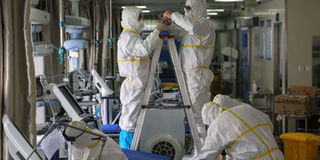Coronavirus may be most infectious during first week

Medical staff seal a vent at a ward used to be an isolation ward for patients infected by the Covid-19 coronavirus at a hospital in Wuhan in China's central Hubei province on March 12, 2020. PHOTO | STR | AFP
What you need to know:
- According to a new preliminary research, COVID-19 is likely at its most infectious during the first week after a person has contracted it.
According to a new preliminary research from Germany, the new coronavirus (COVID-19) is likely to be most infectious during the first week after a person has contracted it.
The research from Bundeswehr Institute of Microbiology in Munich, the Klinikum Munchen-Schwabing, Charite Universitatsmedizin Berlin, and University Hospital LMU Munich -- all in Germany -- was posted Sunday and is still preliminary.
It has not yet been peer-reviewed and only included nine participants, meaning that external specialists have not yet examined it for quality and accuracy.
Research regulations require that such a study be evaluated before it is given a clean bill of health to be used as a guide to clinical practice.
However, their findings are useful as they may give important insight on how easily the disease could be spread in the early stages of infection.
"In the present study, peak concentrations were reached before day 5, and were more than 1000 times higher," the report says.
Experts says the researchers’ findings is a wakeup call to facilities handling new cases to avoid hospital bed shortage by discharging people from the hospital early on and advising self-isolation.
“In a situation characterised by limited capacity of hospital beds in infectious disease wards, there is pressure for early discharge following treatment. Based on the present findings, early discharge with ensuing home isolation could be chosen for patients who are beyond day 10 of symptoms,” the researchers write.
Since January, when the World Health Organization (WHO) declared the new coronavirus outbreak a global public health emergency and later a pandemic, research about the new coronavirus has been gathering momentum fast.




